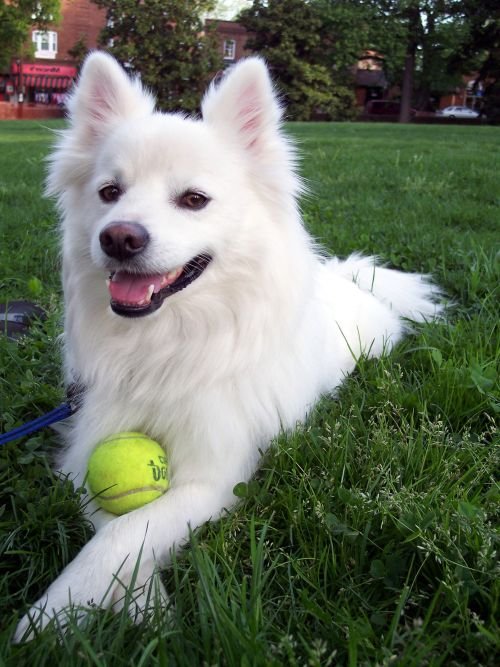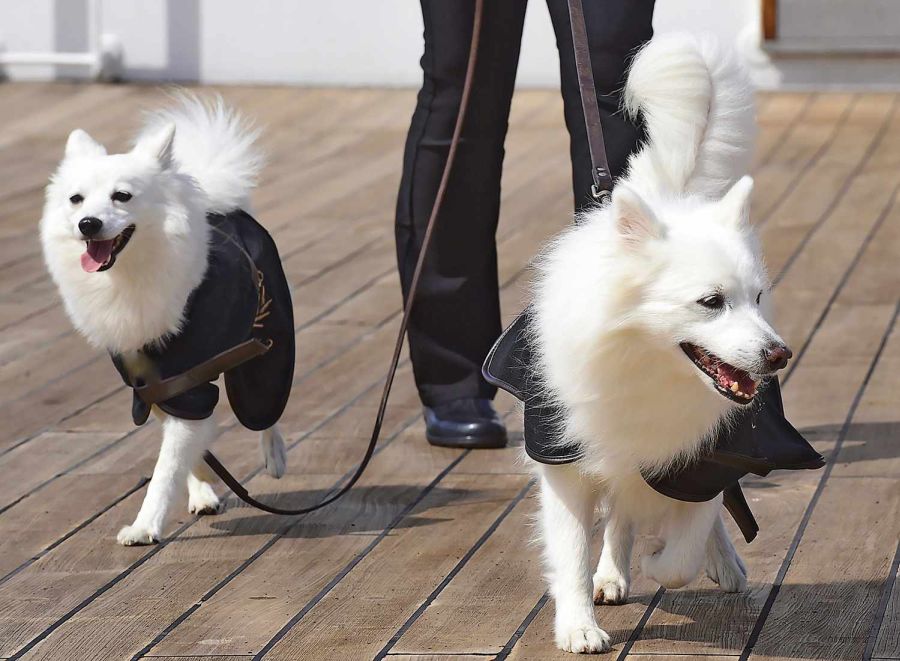
The American Eskimo dog or “Eskie” is a descendant from several Spitz breeds such as the White Keeshond, White German Spitz, White Pomeranian, and Volpino Italiano or White Italian Spitz.
German settlers brought the breed to America and was widely used as part of circus acts in the area.
During World War I, the American Eskimo was still known as the American Spitz, but to distance it from its German origin and may be due to the political climate during the era, it was renamed to what we now know them for.
One-Time Cost When Buying an American Eskimo Dog
If you’re looking to purchase a dog, and are still deciding what breed to acquire, here are the costs that you need to think about when buying an Eskie:
- Purchase cost
The American Eskimo is not widely considered as a run-of-the-mill choice for a pet, but it is slowly being introduced to the fray. American Eskimo prices average from $600 to $800, and for top quality pets, you can expect to pay around $1,500 to $5,200.
Make sure you are careful in selecting a reputable breeder. There are several recognized breeders at the AKC Marketplace that propagates the line.
You can adopt one as well, and adoption prices may range from $300 for 6 to 11 months old puppies to $150 for senior dogs. These are available at either the Eskie Rescuers or HeartBandit.
- Transportation costs
When you need to travel by air, you have a few options when you want to bring your American Eskimo. You do need to bring your pet’s vaccination certificate, its transport crate, and of course, an airline ticket.
When you’re traveling by land and you have your own car, you have the option of using a transport crate for your pet or you can also let it sit with you.
Transport crate prices depend on size and Petco offers kennels and crates from extra small sizes priced at $27.99 to large sizes at $69.99. Make sure to add 2 inches when measuring your Eskie so that it would be comfortable in the transport crate.
- Registration Fees
Upon purchasing your American Eskimo, you can register it online through the American Kennel Club site. It offers services such as providing health insurance for your Eskie that can cover up to $1,500 in medical fees; AKC Certified Pedigree certificate which allows you to discover your dog’s ancestry; or lifetime enrollment to AKC Reunite which offers a custom collar tag and 24/7/365 protection, depending on the package that you purchase.
Maintenance Expenses of American Eskimo Dogs
- Grooming Kits
As Eskies are known to have a dense undercoat and a longer topcoat, they would need to be brushed 2 to 3 times in a week to avoid matting and to remove dead hairs. You can use an aloe hydrating spray to nourish the skin and coat.
When bathing your pet, use a hypo-allergenic shampoo as it is gentle on the skin and helps maintain the texture of the coat. It retails at $11.99 for a 20-oz bottle. Use ear powder after bathing to remove hair from the ear canal as it reduces the smell and dries the canal. You can buy a bottle at $10.00.
Once you go out to exercise your American Eskimo, you can bring Aloe Vera jelly to relieve bites from insects and any mild rashes that may occur or sun burn. A 4-oz bottle retails at $7.38.
- Health Maintenance
Eskies are prone to hip dysplasia, progressive retinal atrophy, Legg-Calve-Perthes disease, and juvenile cataracts, to name a few. So take special care when buying from a breeder to save you from paying a lot of money for veterinary bills and heartache.
It is recommended that in a puppy’s first year of life, there are costs to be considered for the much-needed vaccinations such as for DHLPP: Distemper, Hepatitis, Leptospirosis, Parvo, and Parainfluenza. You should be expecting to pay during the puppy’s 6th, 12th, and 16th week around $75 to $100 for these and the rabies vaccinations from $15 to $20.
If you’re planning to adopt, shelters offer vaccines at around $20 or you can get it done for free. Dogs from animal shelters though are most often vaccinated already before they were rescued or sent to the shelter.
You’d usually have to pay $35 for testing on hip dysplasia for your dog when it gets past 2 years. For Legg-Calve-Perthes screening, expect to pay around $25 when your Eskie hits the 1-year mark.
- Food
Almost all dogs are prone to obesity so it is best to watch your Eskie’s food intake. For 6 to 12 weeks old, it’s recommended to feed your American Eskimo 4 times a day. Once it reaches a certain age, you lessen the food you give it.
There are available options for you to look into, especially if you’re on a budget. There are brands of dog food that caters to all stages.
Whole Hearted has a great line that is for all stages and comes highly recommended for pets with allergies or if you’re just regulating your pet’s calorie intake. It retails at $39.99 for a 25-lb bag.
- Toys
American Eskimo dogs are very alert, energetic, and very friendly although they have a protective temperament. They tend to get bored when they are not properly exercised or interested in an activity, so, take special care in choosing their toys.
There are rawhide flips available that retails at $39.97 or you can go for a dog toy at $9.74 that can be used either for chewing, tugging or fetching.
Be sure to have a steady supply of sturdy toys so your Eskie will be occupied with these instead of objects that you’re especially fond of, like your shoes. Eskies can be housed in apartments, so toys are also a welcome distraction when you need to leave them for short periods of time.

Why Choose an American Eskimo In The First Place
American Eskimo dogs are very adaptable. They are active indoors and even if you have a small space for your yard, it will work very well with your Eskie. They can be very good with kids as they are playful, energetic, and affectionate. They love to play hard and engage in vigorous exercise, making them a good fit for people who like to run outside.
